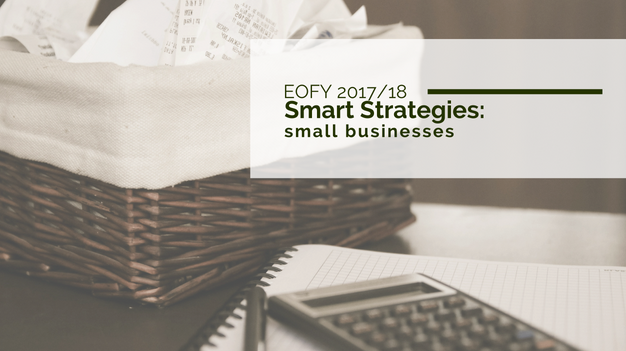Many business owners like to review their tax position at the end of the income year and evaluate any year-end strategies that may be available to legitimately reduce their tax. Traditionally, year-end tax planning for small businesses is based around two simple concepts – i.e., maximising business deductions and deferring income. In this blog post, we will focus on maximising deductions for small business owners.
Accelerating expenditure
Small businesses can choose to write-off depreciable assets costing less than $20,000 in the year of purchase*. Also, assets costing $20,000 or more are allocated to an SBE general pool and depreciated at 15% (which is half the full rate of 30%) in their first year. Therefore, where appropriate, SBE business taxpayers should consider purchasing/installing these items by 30 June 2018.
It should be noted that SBE taxpayers choosing to use the SBE depreciation rules are effectively ‘locked in’ to using those rules for all of their depreciable assets.
Further note, former STS taxpayers who have continued to use the STS cash method since before 1 July 2005 and who qualify as an SBE are generally only entitled to deductions if they have paid the amount by 30 June.
*The small instant asset write-off threshold has been temporarily increased to ‘less than $20,000’, for assets acquired and installed ready for use between 7.30 pm (AEST) 12 May 2015 and 30 June 2018. On 8 May 2018 the Government announced it intends to extend this date to 30 June 2019.
Prepayment strategies
Small businesses making prepayments before 1 July 2018 can choose to claim a full deduction in the year of payment where the prepaid expenses cover a period of no more than 12 months (ending before 1 July 2019).
The kinds of expenses that may be prepaid include:
- Rent on business premises or equipment.
- Lease payments on business items such as cars and office equipment.
- Interest – check with your financier to determine if it’s possible to prepay up to 12 months interest in advance.
- Business trips.
- Training courses that run on or after 1 July 2018.
- Business subscriptions.
- Cleaning.
The basic requirement to be eligible for most of the SBE concessions for the year ending 30 June 2018 is that the business taxpayer’s annual turnover (including that of some related entities) is less than $10 million.
Have a question? Contact us to discuss.
[Originally posted on the OakWealth Blog]





